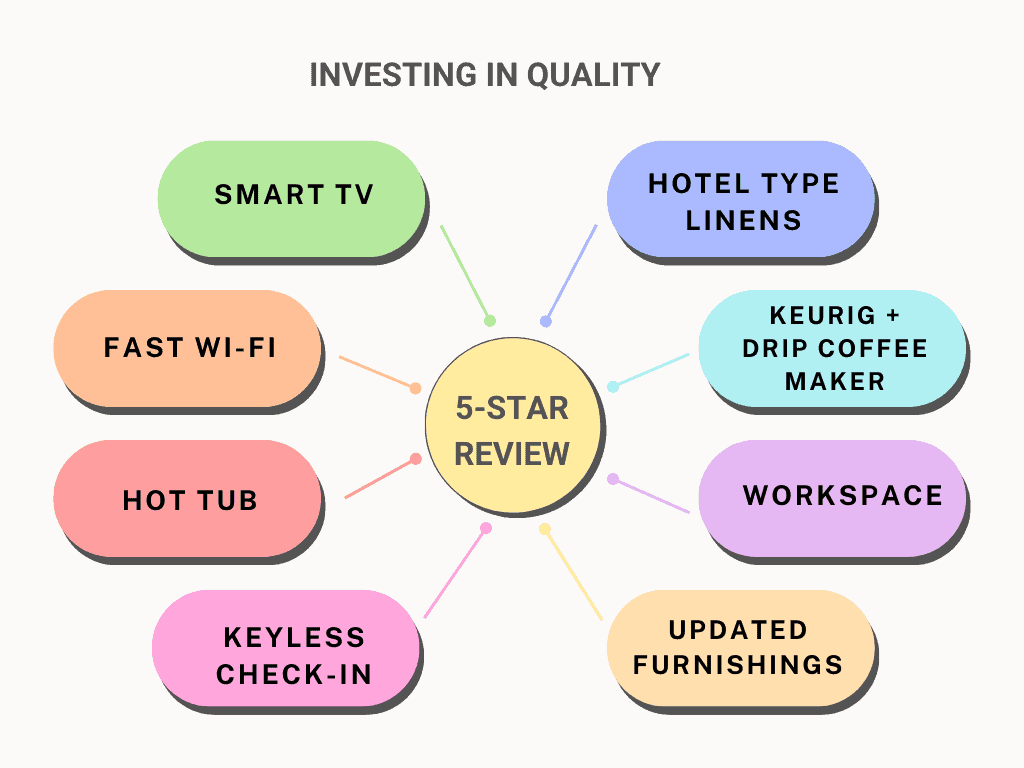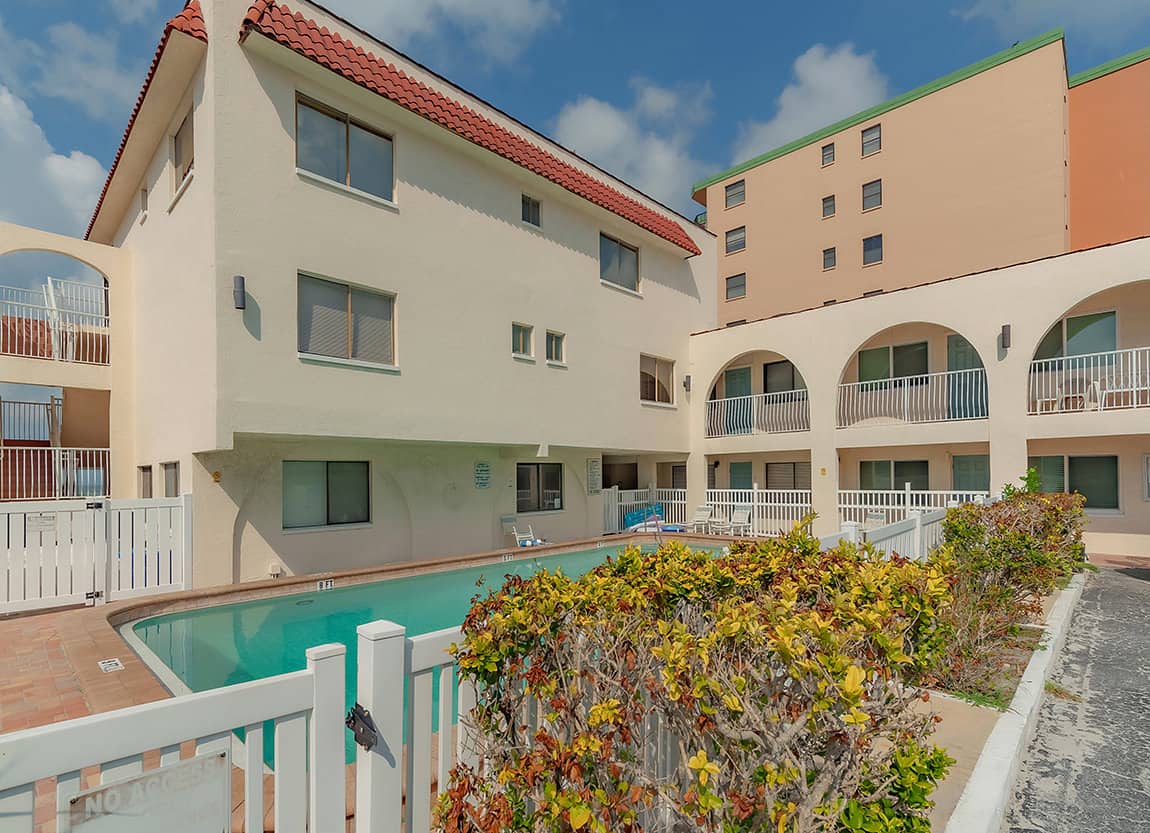Introduction
In recent years, the short-term rental industry has seen a significant boom. With the advent of platforms like Airbnb, VRBO, Booking.com and most recently Google Vacation Rentals, homeowners around the globe have great opportunities to generate income from their investment properties or unused spaces. Whether you already own a property or are in the consideration stage, in this post we outline our firsthand experience on maximizing short-term rental profits for long-term success.
The appeal of unique, affordable lodging options has also enticed travelers away from traditional hotels, contributing to the industry’s rapid expansion.
Here’s what we will cover:
- Planning for Maximizing Short-Term Rental Profits
- Understanding Your Market
- Investing in Quality Properties
- Short-term Rental Pricing Strategies
- Optimizing Your Online Presence
- Delivering Exceptional Guest Service
- Legal and Tax Considerations
- Ongoing Learning
Importance of Strategic Planning for Maximizing Short-Term Rental Profits
Strategic planning is critical to optimize profits in the short-term rental market. Now we know that planning can sound tedious – sometimes it is. But if you approach planning from the viewpoint that you are working to build wealth, things become easier.
Good planning entails understanding your market dynamics – things such as peak travel periods, local events and competition, as well as adjusting prices, availability and marketing efforts. Also, solid strategic planning involves forecasting expenses, such as maintenance, cleaning and utilities, to calculate the optimal rate.
A thorough plan ensures that your property is competitive and appealing to potential guests, thereby maximizing occupancy and revenue. It also helps you prepare for unforeseen circumstances, ensuring the sustainability and profitability of your rental business in the long term. Remember that strategic planning is not a one-time task but a continuous process that requires regular reassessment and adjustment to stay ahead in this fast-paced industry.

Examples of Strategic Planning for Short-Term Rental Profits
Strategic planning for short-term rental profits can take multiple forms depending on factors such as location, property type and target market. For example, if you own a property in a city that hosts a popular annual festival, you could strategically plan to increase your rental rates during this peak period to maximize income. Conversely, in a quiet off-peak period, you might offer discounts to attract guests and maintain occupancy.
Another strategic planning example might involve investing in property upgrades that appeal to your target market. If your property is in an urban area and mainly attracts business travelers, you might invest in high-speed internet, a dedicated workspace and express check-in/check-out services. For properties in vacation destinations, upgrades could include leisure-focused amenities like a hot tub, a game room or partnerships with local tour operators.
Effective strategic planning also includes anticipating and preparing for potential challenges. For example, planning for routine maintenance and unexpected repairs ensures your property remains in top condition and available for bookings, while a contingency fund helps cushion any financial impact from unforeseen events like a pandemic or natural disasters.
Finally, strategic planning may involve optimizing your online presence across multiple booking platforms, employing SEO tactics to increase visibility and utilizing customer feedback to improve services and guest satisfaction. Every strategic plan should be regularly reassessed and updated, keeping pace with industry trends, guest preferences, and market dynamics.
Understanding Your Market
Understanding the various types of short-term rental markets is integral to maximizing your profits. Generally, these markets can be categorized into three main types:
- Urban Rentals: These are properties located in bustling cities and metropolitan areas. They attract a diverse range of guests, such as business travelers, city explorers or people needing temporary housing. Key considerations for these properties include proximity to business districts, popular attractions, public transportation, overall walkability factor and quality of amenities.
- Vacation Rentals: These properties are usually situated in popular vacation destinations like beach towns, mountain resorts or near national parks and theme parks. They tend to attract tourists, families or groups of friends on vacation. For vacation rentals, factors like scenic views, accessibility to tourist attractions and the availability of recreational amenities can significantly influence occupancy rates and profitability.
- Event-based Rentals: These are properties in areas that host major events, such as festivals, conventions or sports tournaments. They experience peak demand during these events, attracting attendees who prefer homely accommodations as opposed to standard hotels. Pricing and marketing strategies need to be aligned with the event schedule to maximize profits.
Understanding your market type can help you tailor your property to meet the specific needs of your potential guests, optimize your marketing and pricing strategies, and ultimately, increase your rental income.
For example, for our ski resort properties, we create a ski-themed experience for our guests. From ski racks to ski decor, we tap into the experience our winter guests are looking for.
Understanding Demand and Pricing in Your Local Market
Gaining comprehensive insights into the demand and pricing within your local market is vital for optimizing your short-term rental business. It includes studying the demand patterns in your area, from seasonality and local events to longer-term trends such as urban development or tourism influx.
Seasonality plays a significant role in demand. Vacation rentals may see a surge in demand during holiday periods, while urban rentals can have consistent demand throughout the year, with occasional spikes during major local events or business conventions. Event-based rentals, on the other hand, require careful tracking of the event calendar to understand peak demand periods.
Understanding pricing in your local market involves researching what comparable properties are charging and identifying the factors justifying these rates. These factors could include property size, location, amenities and the quality of service provided. Tools like Airbnb’s Smart Pricing and other dynamic pricing software such as AirDNA can help you adjust your prices based on market demand and competition.
Remember, pricing should not be a ‘set and forget’ decision but should be responsive to changes in the market. Regularly reviewing and adjusting your pricing strategy gives you the flexibility to stay competitive, attract guests, and maximize your profits. By comprehensively understanding your local market demand and pricing dynamics, you can make informed strategic decisions for your short-term rental business.
Investing in Quality
Investing in the quality of your property is a significant factor in attracting bookings and achieving rental success. Quality, in this context, pertains to the standards of the physical property including cleanliness, decor, appliances, furniture and amenities, as well as the overall guest experience.
A well-maintained, aesthetically pleasing property with modern conveniences such as Wi-Fi, smart TVs, and high-quality linens can set your listing apart in a competitive market. Additionally, investing in unique amenities that cater to your target market, such as a workspace for business travelers or play equipment for families, can further increase your property’s appeal.
Conversely, properties of subpar quality may result in negative reviews, reducing your overall rating and discouraging potential guests. Investing in quality is therefore not just about attracting bookings, but also about ensuring guest satisfaction and repeat business.
Remember, a guest’s perception of quality extends beyond the property to the entire rental experience. Quality service, including clear communication, easy check-in procedures, and responsiveness to guest issues, significantly contributes to repeat bookings and positive word-of-mouth referrals.
Ultimately, the role of property quality in the short-term rental market cannot be understated. It serves as a key differentiator and is integral to building a profitable, sustainable rental business.

Enhancing Aesthetic Appeal and Functionality of Your Rental Property
Striking the right balance between aesthetic appeal and functionality can significantly elevate the guest experience in your rental property and help in maximizing short-term rental profits. Here are some tips to achieve this:
- Consistent Design Theme: Stick to a consistent design theme throughout your property. This could be modern, rustic, minimalist or any style that matches the property’s architecture and location.
- Highlight Unique Features: If your property has unique architectural elements, such as exposed brickwork, wooden beams or bay windows, highlight these features to add character and charm.
- Quality Furnishings: Invest in good-quality, comfortable furnishings. Prioritize key pieces such as beds, sofas and dining tables, as these significantly impact guest comfort.
- Neutral Colors: Opt for a neutral color palette for walls and large furniture pieces. This creates a calming, spacious feel and provides a versatile backdrop for adding splashes of color with accessories.
- Lighting: Use a combination of ambient, task and accent lighting to create a warm and inviting atmosphere. Ensure all areas of the property are well-lit.
- Functional Layout: Arrange furniture in a way that maximizes space and facilitates easy movement. Consider the flow of traffic and the purpose of each room when deciding on layout.
- Clear Clutter: Keep décor minimal and organized to avoid a cluttered appearance. Provide sufficient storage options to keep essentials neatly stored away.
- Outdoor Spaces: If your property has an outdoor space, make it inviting with comfortable seating, ambient lighting, and attractive plantings.
- High-Quality Photos: Capture your property’s best features with professional-quality photographs to showcase on your listing.
Remember, when enhancing your property’s aesthetic appeal and functionality, keep your target market in mind. Tailor your design and décor choices to cater to their preferences and needs for the best results.
Short-Term Rental Pricing Strategy
The Importance of Dynamic Pricing with Short-Term Rentals
Dynamic pricing is an indispensable strategy for short-term rental hosts seeking to maximize their revenue. This pricing model involves adjusting rental rates in real-time according to market demand, allowing hosts to price their properties competitively and increase their earnings during periods of high demand. For instance, rates might be increased during popular travel seasons or local events and lowered during off-peak periods to attract bookings.
Dynamic pricing is not just advantageous for hosts, it also benefits guests by offering more competitive pricing based on the time of booking and stay. This approach ensures that your property is neither overpriced nor underpriced at any given time, thus improving occupancy rates and overall profitability.
Furthermore, dynamic pricing automates the pricing process, saving hosts considerable time and effort that would be spent manually updating prices. Several third-party tools and platforms offer dynamic pricing services, making it accessible and easy to implement for hosts.
In conclusion, a dynamic pricing strategy is an essential tool for hosts looking to stay competitive and profitable in the ever-fluctuating short-term rental market. It offers the flexibility to adapt to changes in market demand, ensuring that your pricing strategy is always optimized for maximum revenue.
Tools and Techniques for Determining Optimal Pricing
Determining the optimal pricing for your short-term rental property can be a complex task, but there are various tools and techniques available to simplify this process:
- Market Research: Conducting thorough market research is a crucial first step. It involves analyzing similar properties in your area, their amenities, peak seasons, and the pricing strategies they follow. This provides valuable insights into competitive pricing in your specific locale.
- Dynamic Pricing Tools: There are numerous dynamic pricing tools available, such as PriceLabs, Beyond Pricing, AirDNA and Wheelhouse. These platforms use machine learning algorithms to analyze market data in real-time, adjusting your rental rates based on factors like local demand, seasonal trends, and local events.
- Performance Tracking: Monitoring the performance of your rental property over time can help you adjust your pricing strategy. Tools like AirDNA and Mashvisor provide detailed analytics on occupancy rates, revenue generation, and overall performance, enabling you to make data-driven pricing decisions.
- Yield Management: This technique involves adjusting prices based on the occupancy of your property. For instance, you could lower prices when your property is vacant and increase them when it’s highly occupied.
- Revenue Management Systems (RMS): These advanced tools offer comprehensive revenue management solutions, including real-time pricing adjustments, forecasting, inventory management, and more. RMS like Lodgify, Guesty and Kigo can be particularly beneficial for managing multiple properties.
Remember, the goal of using these tools and techniques is not only to maximize your revenue but also to offer fair and competitive pricing to your guests. By leveraging these resources, you can ensure that your pricing strategy is data-driven, dynamic, and aligned with the realities of the short-term rental market.
Optimizing Your Online Presence
The Role of Online Platforms in Promoting Your Rental Property
Online platforms play a vital role in promoting your short-term rental property. Websites like Airbnb, Booking.com and VRBO provide a marketplace where hosts can list their properties, reaching a global audience of potential guests. These platforms not only give your property visibility but also offer a secure environment for transactions.
Moreover, they provide tools for hosts to manage their listings efficiently, track performance, and communicate with guests. The review systems on these platforms also build credibility and trust, crucial factors for attracting new guests. Effective use of high-quality images and detailed descriptions can further enhance your listing’s attractiveness.
Social media platforms like Facebook, Instagram, X and Pinterest can also be leveraged to promote your property. By sharing engaging content about your rental and the surrounding area, you can attract potential guests and direct them to your listing.
Remember, the key to success on these platforms is active engagement. Respond to inquiries promptly, keep your listing information up-to-date and continually seek ways to improve your ranking on platform search results. Online platforms, when utilized effectively, can significantly enhance the visibility of your rental property, attract more guests, and ultimately contribute to your business’s growth and profitability.
Tips for Creating Compelling Listings and Using SEO Strategies
Creating a compelling listing is a blend of art and science. The first step is crafting an appealing headline that immediately catches the attention of potential guests. It should succinctly communicate the unique attributes of your property. You can read more about creating amazing headlines here.
Property description: your description is just as critical. Describe your property in detail, highlighting its unique features, amenities, and the experience guests can expect. Be sure to mention the number of bedrooms, bathrooms, the style of the property, and any unique features. Also, describe the neighborhood and nearby attractions.
Most of the larger platforms have a sequence you can follow to ensure you have covered the most important aspects of your property.
High-quality photos: in short, invest in professional photography! Doing so can significantly enhance the appeal of your listing. Good lighting, wide angles, and attention to detail can make a huge difference. Consider hiring a professional photographer to capture your property in its best light.
SEO: an appealing listing is only half the battle. You should also optimize it for search engines (SEO). Here are a few tips:
- Use Keywords: Identify the keywords potential guests might use to find a property like yours and include them in your headline and description. These could include terms like “cozy cabin in Aspen” or “beachfront villa in Malibu”.
- Local SEO: Mention nearby landmarks, attractions, and popular destinations in your description. This can help your listing appear in relevant local searches.
- Encourage Reviews: Positive reviews can improve your SEO ranking. Encourage your guests to leave a review after their stay.
- Keep Your Listing Updated: Regularly updating your listing can signal to search engines that your listing is active and relevant.
By creating a compelling and SEO-optimized listing, you can attract more guests, increase your visibility, and ultimately, boost your revenue.
Delivering Exceptional Customer Service
Delivering exceptional customer service is a cornerstone of a successful short-term rental business. Positive guest experiences not only contribute to securing repeat bookings but also play a pivotal role in garnering positive reviews, which are crucial to establishing credibility and attracting potential guests.
When guests have a delightful and seamless experience, they are more likely to return to your property for their future travels. Repeat bookings are beneficial, as they provide a steady stream of revenue and reduce the need for constant marketing efforts to attract new guests. Furthermore, satisfied guests often become ambassadors for your property, recommending it to their friends, family, and social networks.
Moreover, the impact of positive reviews on your rental business cannot be overstated. In the digital world, where potential guests often base their booking decisions on the experiences of previous guests, positive reviews function as a powerful marketing tool. They enhance your property’s reputation, improve your ranking on rental platforms, and boost your overall visibility.
Therefore, focusing on providing superior customer service to create positive guest experiences can significantly enhance the success and profitability of your short-term rental business.
Tips for Providing Top-Notch Customer Service
To ensure your short-term rental business stands out in a competitive market, here are a few tips for providing top-notch customer service:
- Clear and Prompt Communication: Be responsive to your guests’ queries and requests. Answer their questions promptly and provide them with all necessary information about their stay. Clear and timely communication makes guests feel valued and cared for.
- Personalized Services: Try to personalize the guest experience as much as possible. Small gestures like a personalized welcome note or customizing amenities based on guests’ preferences can make a significant difference.
- Be Proactive: Anticipate your guests’ needs even before they ask. For instance, providing useful local information, instructions for appliances, WiFi password, etc., upon their arrival can enhance their experience.
- Offer Assistance: Make your guests aware that you’re available and willing to help them during their stay. This gives them reassurance and enhances their overall satisfaction.
- Maintain Cleanliness and Comfort: Ensure that your property is clean, comfortable, and well-maintained. A clean and cozy environment enhances guest satisfaction and reduces the likelihood of complaints.
- Request Feedback: After their stay, ask your guests for feedback. This will not only help you improve your services but will also show your guests that you value their opinions.
Remember, providing excellent customer service requires a commitment to consistently exceeding guest expectations. By adhering to these tips, you can significantly enhance guest satisfaction, improve your reputation, and ultimately, increase your short-term rental business’s profitability.
Legal and Tax Considerations
Understanding and adhering to the laws and regulations related to short-term rentals is a crucial aspect of running a successful rental business. These laws vary widely by city, state, and country, and can cover everything from zoning and licensing to taxes and safety compliance.
Zoning laws define how a property can be used, and whether short-term rentals are allowed. Some areas may require special permits or licenses for operating such a business. It’s essential to check with your local city or county administration to understand the zoning laws in your area.
In addition to zoning laws, most regions require short-term rental owners to collect and remit certain taxes. These can include occupancy tax, sales tax, or tourism tax. These taxes should be clearly stated in your rental agreement and collected from your guests.
Health and safety regulations are also an important consideration. These may include requirements for fire safety equipment, exit signs, carbon monoxide detectors, and more. It’s your responsibility to ensure your property meets all health and safety standards.
Failure to comply with these laws and regulations can result in hefty fines, legal actions, or even the closure of your business. Therefore, it’s worth investing time and resources to ensure you fully understand and comply with all relevant laws and regulations for your short-term rental.
Navigating Tax Obligations to Maximize Profits
Navigating tax obligations can be a complex process, yet it is essential for maximizing the profits of your short-term rental business. Developing a clear understanding of these obligations not only helps you avoid penalties and legal complications but can also reveal opportunities for tax deductions that can significantly boost your bottom line.
For instance, expenses related to maintaining and improving your rental property may be tax-deductible. These can include costs for repairs, cleaning services, insurance, and even some utilities. It’s also worth considering the depreciation deduction, which allows you to recover the cost of your rental property over time.
Additionally, if you work from home managing your rental business, a portion of your home office expenses might be deductible. These could encompass a part of your rent or mortgage, as well as other costs like internet service or office supplies.
Remember to keep detailed records of all your expenses for tax purposes. This will make it easier to identify eligible deductions and support your claims in case of an audit. Working with a tax professional who has experience in short-term rentals can prove invaluable in navigating this complex landscape. They can provide expert advice and ensure that you’re taking full advantage of tax laws to maximize your profits.
However, it’s important to remember that tax laws can vary greatly depending on your location. Always ensure that you’re familiar with and adhering to the tax laws applicable in your city, state, or country. Staying up-to-date with these laws will help you maintain compliance and avoid unexpected tax liabilities.
In conclusion, understanding and strategically navigating your tax obligations can play a significant role in maximizing profits in your short-term rental business. Being proactive in this aspect can truly make a difference to your bottom line.
Continual Learning and Adaptability: Key to Success
In the rapidly evolving market of short-term rentals, the willingness to learn and adapt is fundamental to success. Trends are changing swiftly, and technological advancements are transforming how businesses operate. As a rental host, continually educating yourself about market trends, emerging technologies, and best practices is vital.
Participate in industry forums, follow thought leaders, and attend seminars or webinars. This will help you stay informed and spot opportunities for growth or improvement. Similarly, be open to changes and ready to adapt your business strategies as required. The marketplace is dynamic – your strategies should be too.
Remember, continuous learning and adaptability aren’t just about survival, they’re about thriving in this bustling industry.
Conclusion
In conclusion, maximizing profits from short-term rentals necessitates a multi-faceted approach. A commitment to exemplary customer service is paramount, as it can greatly enhance guest satisfaction, bolster your reputation, and thus increase profitability. This entails clear communication, personalized services, being proactive, offering assistance, maintaining cleanliness, and actively seeking feedback.
Furthermore, comprehending and abiding by relevant legal and tax regulations can prevent potential penalties and reveal opportunities for tax deductions which can augment your profits. This includes understanding zoning laws, meeting health and safety standards, and being responsible for appropriate tax collection.
Lastly, navigating your tax obligations strategically can reveal deductions from rental maintenance expenses, home office costs, and property depreciation. Staying informed and compliant with tax laws can mitigate unexpected liabilities and ensure the financial health of your short-term rental business.
Recent Posts
A Security Camera Overview As an Airbnb or VRBO host, your top priorities are the safety of your guests, the protection of your property, and providing a secure environment that allows your guests...
As we delve into the increasingly popular world of short-term rentals, it's no surprise that many of us are intrigued by the potential to tap into this lucrative trend. One opportunity that stands...

